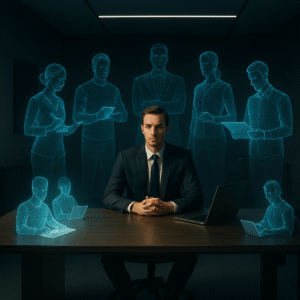Exactly one week ago, investigations conducted by the Civil Police of Paraná (PCPR) led to the preventive arrest of an environmental engineer suspected of falsifying environmental licenses and exemptions in the Instituto Água e Terra (IAT) system. But, by all indications, this is only the first overt step in a broader investigation.
In this context: who else could be reached by the investigation?
The Operation Against Environmental Licensing Fraud
According to reports from G1, Tribuna do Paraná and the PCPR itself, the investigations point to the alleged insertion of false data in self-declaration forms, resulting in over 230 irregular exemptions and the deforestation of approximately 300,000 square meters of Atlantic Forest — equivalent to more than 40 soccer fields.
According to the Civil Police’s official statement, the alleged fraudulent acts included false technical reports, use of third-party documents, and omission of relevant data. These irregularities allegedly allowed the construction of projects in permanent preservation areas (PPAs) and water protection zones, posing potential risks to springs and public water supply.
Professional Ethics and Technical Responsibility
The Paraná Association of Environmental Engineers (APEAM) issued a public statement on October 2, reaffirming the category’s commitment to ethics, oversight, and cooperation with authorities.
This position reinforces a debate that is not new. Back in 2014, while serving as Legal Manager of APEAM, the author (Dr. Igor Rayzel) co-authored with Dr. Amélia Y. Hanai Bortoli the article Civil and Criminal Liability of the Environmental Engineer. The text already warned, at that time, about the possibility of criminal liability for professionals who submit false or misleading technical documents, under Article 69-A of Federal Law No. 9.605/1998 — which criminalizes the preparation or submission of false or misleading environmental studies, reports, or assessments, punishable by three to six years in prison and a fine.
More than ten years later, the warning remains valid. The expansion of self-declaratory licensing systems and exemptions for so-called “low-impact” activities has not made the environmental engineer more vulnerable, but rather more responsible. These tools were designed to streamline the work of environmental agencies, shifting to the professional the prerogative — and the burden — of declaring environmental compliance.
The issue arises when a professional — not to suggest this is the case under investigation, which remains at a preliminary stage and subject to the presumption of innocence — uses this tool to circumvent the system, bypass technical oversight, and obtain authorizations for interventions that would never have been permitted under proper agency review. It is at this point that technical responsibility intersects with criminal law.
From Technician to Contractor: Who Else May Face Environmental Criminal Charges?
Depending on how the investigations unfold, the case may extend far beyond the responsibility of the technical professional, currently the primary focus of the Civil Police. Individuals and companies that allegedly benefited from the irregular licenses or exemptions may also face scrutiny — whether as co-authors or participants in environmentally unlawful conduct.
If proven, the acts of deforestation, construction in protected areas, or vegetation suppression could fall under Articles 38 and 38-A of Brazil’s Environmental Crimes Law (Law No. 9.605/1998). The former criminalizes the “destruction or damage of forest within a permanent preservation area”, while the latter covers the “destruction of primary or secondary vegetation in intermediate or advanced stages of regeneration within the Atlantic Forest biome.”
These are autonomous crimes, whose authorship is not limited to the person executing the act. Those who commission, finance, or knowingly benefit from a fraudulent license may also be investigated, particularly when there are indications of awareness or deliberate negligence. In environmental criminal law, co-authorship and participation extend to anyone contributing to the harmful result, even through instigation, omission, or tacit consent.
This concern was addressed in a recent article by the firm, The Vicious Cycle of Deforestation Complaints Without Technical Evidence, which emphasized that although environmental prosecution requires solid technical evidence — especially valid environmental expertise regarding vegetation type and regeneration stage — the lack of immediate technical proof does not prevent broad investigations that may reach multiple public and private actors.
Therefore, contractors, developers, and property owners whose projects were licensed based on allegedly false technical reports should closely monitor the case. In many situations, the conduct of those who “merely hired” a consultant may be interpreted as instigation, assistance, or conscious adherence to fraud, potentially leading to criminal liability.
And if the alleged irregularities are confirmed, liability will not be limited to individuals. Under Article 3 of Law No. 9.605/1998, legal entities may also face criminal responsibility for acts carried out in their interest or for their benefit. This means that companies, developers, and construction firms that may have benefited from irregular licenses could be included in the investigation, particularly when there are indications of intentional or negligent benefit.
This point was explored in greater depth in the article Criminal Liability of Legal Entities: Can Your Company Be Convicted of Environmental Crimes?, which discusses the parameters for such liability.
The Importance of Early Legal Defense
Cases involving alleged environmental licensing fraud often have ripple effects: a single inquiry can lead to dozens of secondary investigations, involving technical professionals, companies, and property owners who participated in the licensing process at some stage.
Even when actions were taken in good faith, the mere fact that a project was licensed by a professional later investigated may lead to administrative or criminal scrutiny. This is precisely when specialized legal defense becomes essential — ensuring full understanding of both the licensing process and its criminal implications.
As analyzed in Is an Expired Environmental License a Criminal Matter?, not every procedural flaw constitutes a crime — yet premature interpretations by authorities may transform a formal irregularity into a full-fledged criminal investigation.
Therefore, if you are a property owner, builder, or developer whose project was licensed by professionals now under investigation, it is crucial to seek legal counsel specialized in environmental criminal law. Only a technically sound and early defense can ensure the presumption of innocence, correctly delineate responsibilities, and prevent a mere licensing link from evolving into a criminal or environmental liability.
Conclusion
The case currently making headlines in Paraná goes far beyond a criminal investigation. It marks a turning point in Brazil’s environmental licensing model — a system increasingly shifting responsibility to technical professionals and relying on self-declaration and good faith as cornerstones of bureaucratic simplification.
This model only works if accompanied by professional ethics and effective oversight — two elements that must coexist. Experience shows that when one of these pillars fails — whether through state omission or individual misconduct — the result is the erosion of public trust and mass judicialization of productive activities.
As emphasized back in 2014 in the article Civil and Criminal Liability of the Environmental Engineer, the professional’s ethical duty is inseparable from the legal security of environmental licensing. Today, with faster technological tools and broader professional responsibility, that warning becomes even more relevant: public confidence in environmental licensing depends on technical integrity and qualified legal action to ensure that potential irregularities are handled with fairness, evidence, and due process.




